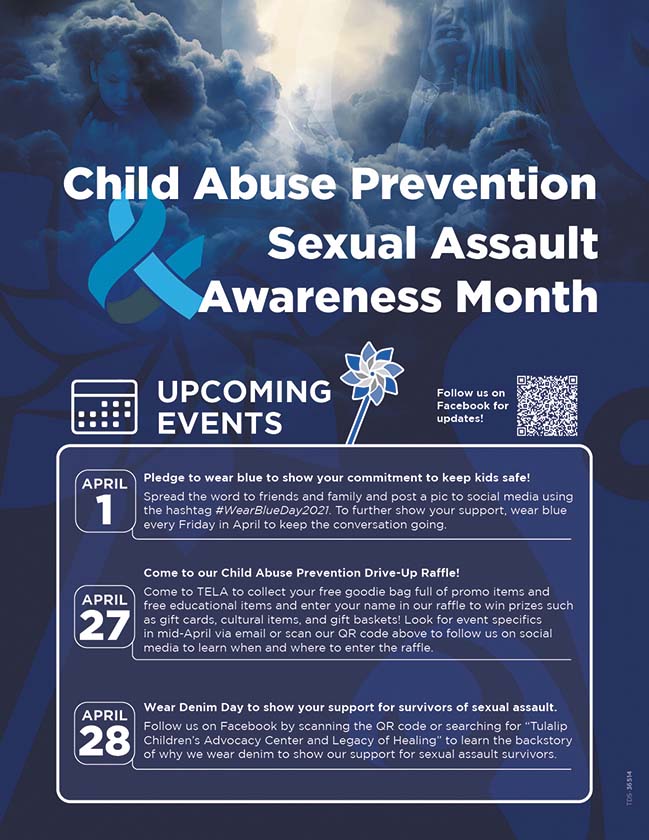Submitted by Sydney Gilbert, Children’s Advocacy Center and Legacy of Healing Coordinator
April is Sexual Assault awareness month and Legacy of Healing wants to share some information about sexual assault safety, prevention and resources. Every 73 seconds, an American is sexually assaulted. Sexual violence effects hundreds of thousands of American’s each year and unfortunately only 5 out of every 1,000 rapists will end up in prison1. We also know national statistics do not reflect the disproportionately higher rate that native women are sexually assaulted. The Justice Department reports that 1 in 3 Native women is raped over her lifetime and that American Indians are 2.5 times more likely to experience sexual assault crimes compared to all other races2.
While it is never the fault of the victim and always the fault of the perpetrator, unfortunately we have to take our safety and education into our own hands. There are several tips you can follow to stay safe in many types of situations outlined on the Rape, Abuse & Incest National Network’s website:
Safety Tips for Traveling
- Before you leave, share your travel plans and schedule with someone you trust. Include the address and phone number for where you will be staying as well as transportation information like flight number.
- Research transportation at your destination and go with a provider that is reputable in the area. Is there a number for them you can call if you have a bad experience?
- Familiarize yourself with the destination by using tools like google maps to scout it out. Is there a police station or hospital near where you’re staying?
- When you get there, beware of “vacation brain”. We want to relax when we travel but listen to your intuition and try not to let your guard down with people you don’t know.
- Alcohol Safety
- Keep an eye on your friends. If you’re out in a group, plan to arrive and leave together. If you decide to leave early, let your friends know. Check in with them throughout the night to see how they’re doing and if something doesn’t look right, step in.
- Know what you’re drinking. Consider avoiding large-batch drinks like punches that may have a deceptively high alcohol content and avoid leaving your drink unattended. Also don’t accept drinks from people you don’t know or trust. Be aware of sudden changes in how your body feels. Some drugs are odorless and tasteless and can be added to your drink without you noticing.
- Remember that even if you were consuming alcohol when a sexual assault occurs, it’s not your fault!
- How you can respond if someone is pressuring you
- Trust your gut! Don’t feel obligated to do anything you don’t want to.
- Have a code word or phrase with friends or family that indicates to them that you need help.
- Plan an escape route; figure out how you would leave quickly if you needed to do so and identify who might be able to help you.
One more thing you can do to prevent sexual assault is to talk about consent and what that means with your friends, family and children. Consent means a wholehearted “yes” and agreement to whatever it is that is being propositioned. Never feel pressured to say yes to anything that you don’t want to do; sexual in nature or otherwise. Practice building those boundaries in everyday situations to learn to recognize consent and become empowered to use it.
If you’ve been sexually assaulted, know that you are not alone and it was not your fault. Know that you can call the police and make a report, even if considerable time has passed since the assault. If the assault was recent (within 96 hours) it’s important to go the emergency room for a Sexual Assault Nurse Exam (SANE). This is important for evidence collection, emergency contraception, and to make sure you’re healthy. While it makes sense that the first thing you would want to do after a sexual assault would be to shower, change your clothes, brush your teeth; avoid doing these activities to aid in the evidence collection process. If you did change your clothes, bring the ones you were wearing before/during the assault without washing them to the SANE. Even if you don’t want to pursue criminal charges, SANE’s are extremely important for your health. Our Legacy of Healing advocates can accompany you to this exam and support you during this process. And if it’s been more than 96 hours since the assault, we encourage you to schedule and exam to make sure you’re healthy. It’s important to know that if you live in or near Tulalip and you need a SANE to go to the Providence Hospital ER in Everett; Cascade Hospital in Arlington is not equipped or trained in SANE exams.
If you or someone you know has been sexually assaulted, encourage them to contact Legacy of Healing at 360-716-4100 if they are an adult. If you or someone you know was sexually assaulted and they are under the age of 18, contact the police as well as the Tulalip Children’s Advocacy Center at 360-716-5437 for services. If you are a Tulalip Tribes employee, you are a mandated reporter and you MUST report concerns of sexual abuse/assault to 1-866-END-HARM. Have as much detail as possible ready when you make the report such as the child’s name, address, date of birth, and the family’s contact information. If you don’t have all of that information that’s okay; proceed with what you do have.
References
About sexual assault. (n.d.). Retrieved April 06, 2021, from https://www.rainn.org/about-sexual-assault
Erdrich, L. (n.d.). Sexual assault. Retrieved April 06, 2021, from https://vawnet.org/sc/gender-based-violence-and-intersecting-challenges-impacting-native-american-alaskan-village-1#:~:text=American%20Indians%20are%202.5%20times,are%20raped%20in%20their%20lifetimes.
